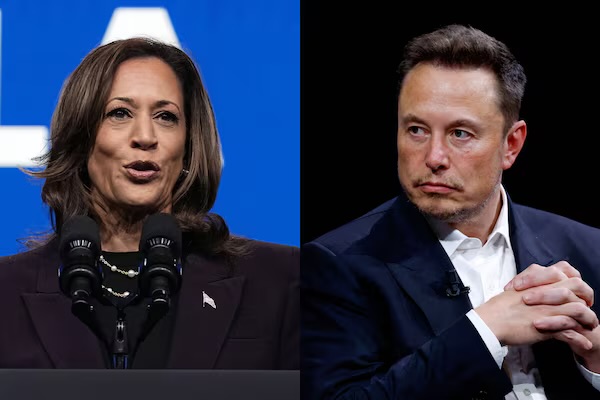A major row has erupted in US politics after late-night host Jimmy Kimmel’s show was suddenly suspended. The controversy has pulled in Elon Musk, former Vice President Kamala Harris, and renewed debates about free speech, censorship, and political hypocrisy.
Jimmy Kimmel Suspension and Harris’ Reaction
Jimmy Kimmel’s show was taken off air after his remarks on conservative activist Charlie Kirk, who died on September 10. Kimmel accused conservatives of exploiting Kirk’s death for political gain, saying the “MAGA gang” had reached a new low.
Soon after, ABC and its affiliates stopped broadcasting Jimmy Kimmel Live!. Reports pointed to pressure from the Federal Communications Commission (FCC). FCC chair Brendan Carr had already warned that ABC’s license could be reviewed. Major networks like Sinclair and Nexstar then withdrew the show.
Carr defended the move, saying broadcasters had to serve the “public interest.” He argued local stations were acting responsibly for their communities. Critics, however, saw the action as politically motivated censorship.
Kamala Harris, who has often spoken about the importance of civil rights and equality, stepped in. She blasted the suspension, calling it an “outright abuse of power.” Harris wrote on X that the administration was silencing critics with fear and threats. She said the media was surrendering and insisted that Americans should not remain silent.
Her statement drew support from Kimmel’s defenders but also renewed criticism of her past actions regarding online speech.
Musk Highlights Harris’ Old Tweet on Trump
Elon Musk entered the debate by resurfacing an old post from Harris. In 2019, while serving as a senator, Harris called for Donald Trump’s Twitter account to be suspended. She wrote: “Look, let’s be honest, @realDonaldTrump’s Twitter account should be suspended.” At that time, she was campaigning for the vice presidency and was openly critical of Trump’s presence on social media.
Musk reposted her words with a thinking face emoji, suggesting hypocrisy. Many users on X echoed the same point, noting that Harris once wanted Trump banned but now defended Kimmel’s right to speak.
The resurfacing of Harris’ 2019 post reignited the larger debate on censorship. Trump had been permanently banned from Twitter in 2021 after the Capitol riots. Critics saw the ban as political silencing, while supporters said it was necessary to prevent violence.
By drawing attention to Harris’ past comments, Musk fueled claims that US leaders apply different standards depending on who is speaking. The clash deepened divides between supporters of broad free speech and advocates of tighter moderation.
Qatar seeks guarantees as Trump disowns Israeli strikes and vows to prevent repeat
Broader History of Censorship Disputes
The Biden-Harris administration also faced its own controversies related to speech. During the Covid-19 pandemic, the White House admitted in 2021 that it flagged Facebook posts spreading vaccine misinformation. Officials said it was about protecting public health, but opponents accused the administration of pressuring tech companies to censor dissent.
In 2024, Meta CEO Mark Zuckerberg revealed that his company faced repeated demands from the Biden administration to act on content labeled as harmful. His letter reignited accusations that the government was interfering with online platforms.
The Kimmel suspension added another layer to this history. Unlike Trump, who was a political leader, Kimmel is a comedian. Traditionally, late-night hosts in the United States have mocked politicians without facing suspension. The sudden cancellation of his show after critical remarks raised concerns about limits being placed even on entertainment figures.
Supporters of free speech argue that once regulators and political leaders begin targeting media or comedians, it risks creating a chilling effect. Broadcasters may start avoiding content that could be seen as offensive to those in power. Critics of Harris stress that defending Kimmel now while calling for Trump’s ban in the past shows inconsistency.
The debate highlights a recurring issue in US politics: who decides what counts as acceptable speech. Elon Musk has repeatedly argued that social media platforms should allow more speech, even when it is offensive. His revival of Harris’ old words was another example of his challenge to political figures who call for restrictions on others.
